September 20, 2025
12 Best HR Software for Startups in 2025: A Founder's Guide
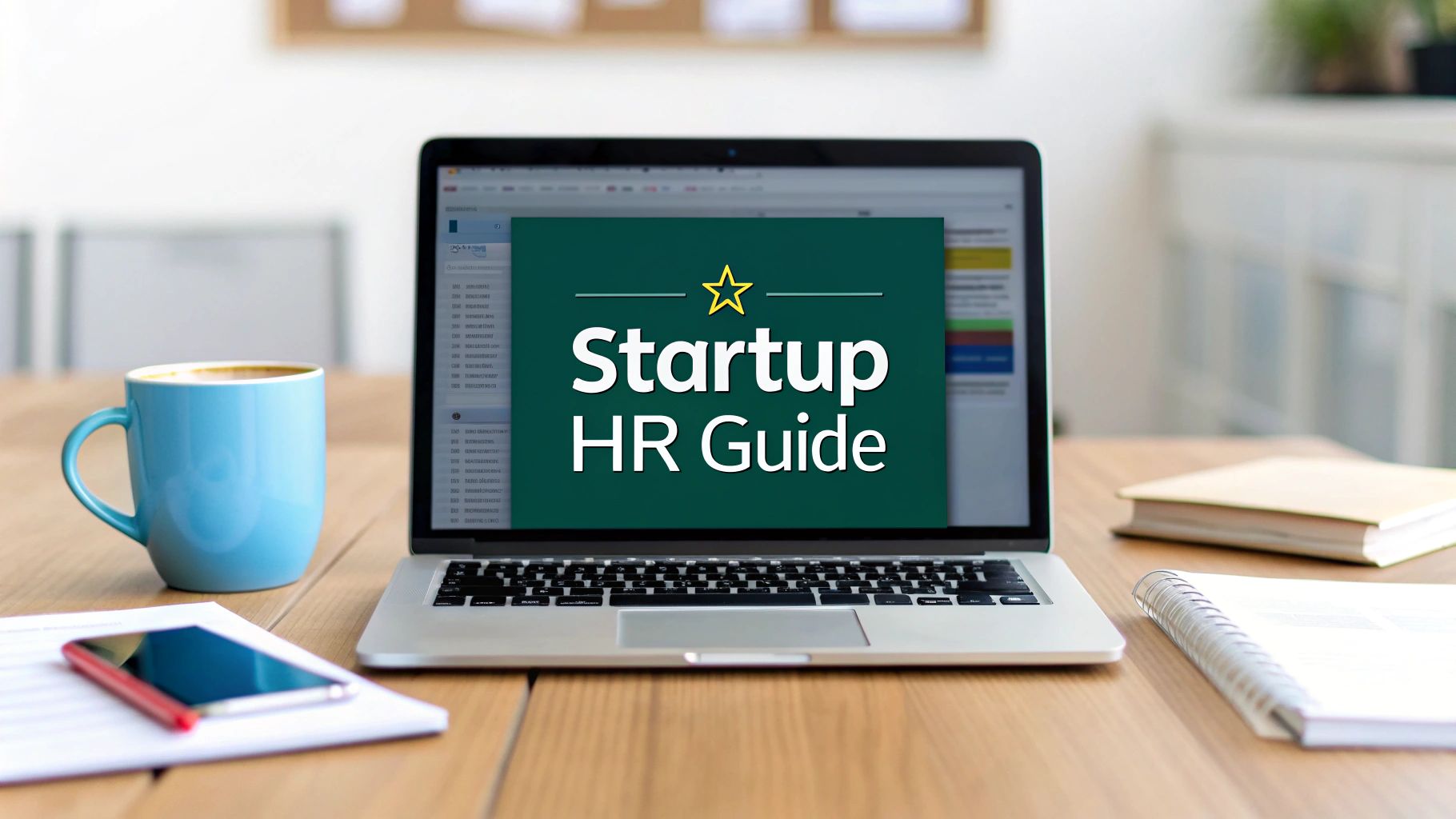
As a startup founder, you're building everything from the ground up: your product, your team, and your culture. The right HR software isn't just an administrative tool; it's the operational backbone that supports your team as you scale from five employees to fifty and beyond. Juggling payroll, compliance, benefits, and hiring can quickly divert your focus from your core mission. The challenge is finding a solution that's affordable and simple enough for today but powerful enough for tomorrow.
This guide cuts through the noise to help you find the best HR software for startups tailored to your specific stage of growth. We provide a detailed breakdown of 12 top platforms, analyzing each one's unique strengths, ideal use cases, and potential limitations. For many founders, adopting a powerful HR platform provides benefits that mirror the advantages of outsourcing human resources by freeing up critical time and ensuring compliance.
Each entry includes screenshots, direct links, and practical insights to help you make an informed decision that fuels your growth, not hinders it. Let's explore the tools that will help you manage your people operations efficiently, so you can get back to building the future.
1. Klearskill
Best for: AI-Powered Talent Acquisition and Bias-Free CV Screening
Klearskill stands out as a powerful, AI-driven recruitment platform that addresses one of the most significant bottlenecks for scaling startups: efficiently screening high volumes of resumes. Instead of a broad, all-in-one HRIS, Klearskill offers a specialized solution that revolutionizes the top of the hiring funnel. Its core strength lies in its ability to automate and refine CV analysis with exceptional speed and precision, making it an indispensable tool for startups focused on rapid, quality-driven growth.
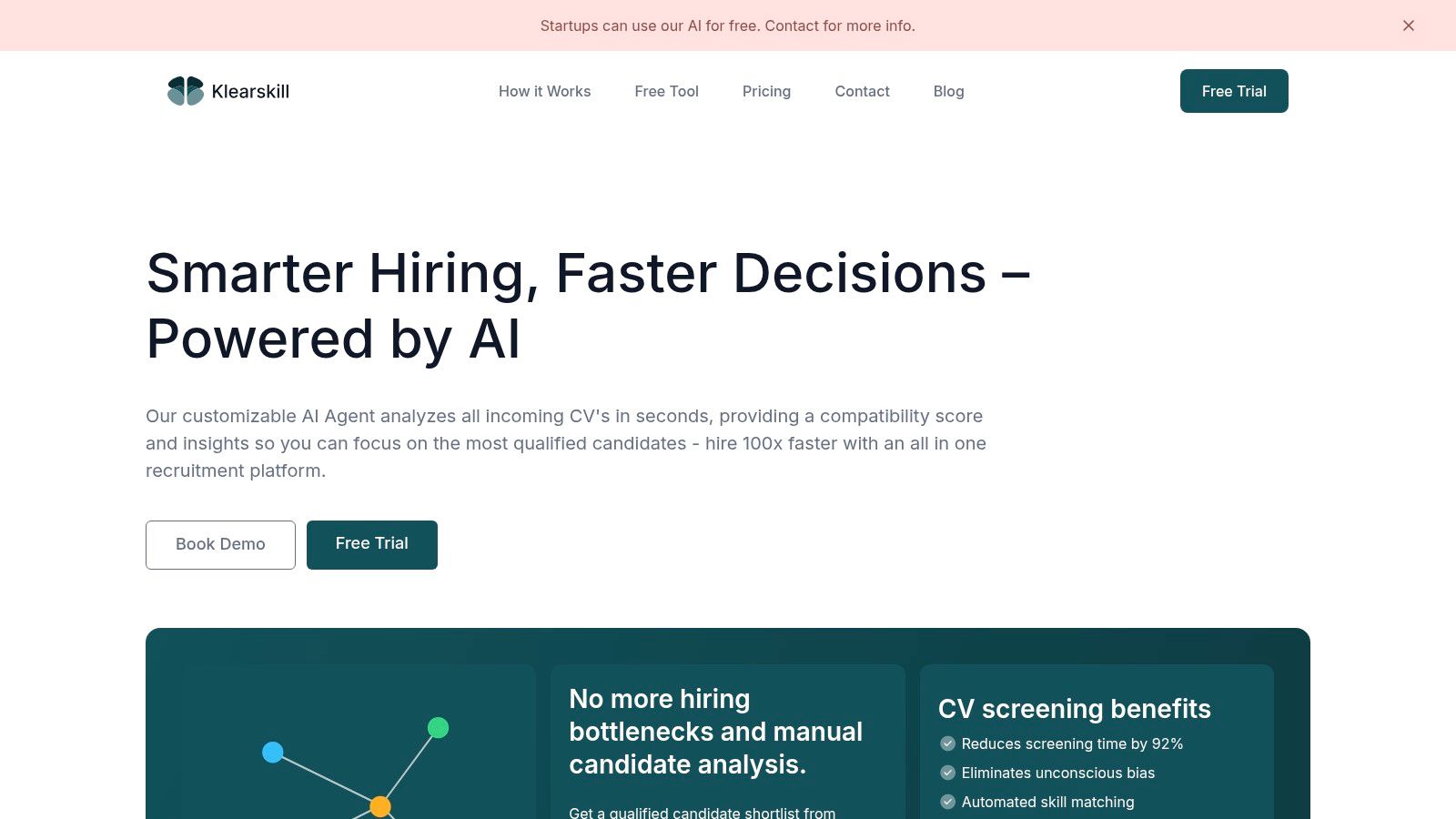
This platform isn't just about speed; it's about intelligent, customized filtering. Startups can define hyper-specific criteria, from technical proficiencies to years of industry experience, and the AI assigns a compatibility score to each candidate. This functionality ensures that recruiters spend their time engaging with the most qualified individuals, dramatically accelerating the hiring cycle.
Key Features and Use Cases
Klearskill’s feature set is laser-focused on optimizing talent acquisition. Its bi-directional ATS sync ensures seamless integration into existing workflows, eliminating the need for disruptive system changes. This makes it one of the best hr software for startups looking to enhance, not replace, their current tools.
- Customizable AI Screening: Configure the AI to prioritize candidates based on your unique needs. For example, a fintech startup can train the model to specifically identify candidates with experience in blockchain development and regulatory compliance.
- Bias Elimination: The platform’s algorithm is designed to remove unconscious bias by focusing solely on skills and qualifications, leading to a more diverse and equitable talent pool.
- Advanced Analytics: Gain deep insights into your talent pipeline, identify patterns in successful hires, and refine your recruitment strategy with data-driven reports.
- High-Volume Recruitment Management: Ideal for startups experiencing rapid growth or recruitment agencies managing multiple client roles, Klearskill processes thousands of applications in minutes.
Pricing and Access
While Klearskill does not list its pricing publicly, it offers customized plans for different business sizes. Startups may be eligible for free access, making it a highly accessible option for early-stage companies. Enterprise and staffing firm pricing is available upon request through a direct sales inquiry.
Pros & Cons
Website: klearskill.com
Further Reading: You can explore a deeper comparison of tools in this space; learn more about the best AI recruitment tools on klearskill.com.
2. Gusto
Gusto has cemented its place as a top-tier HR software for startups, largely due to its exceptional payroll-first approach. It simplifies the most complex and critical HR function for new businesses: paying people correctly and on time. Its all-in-one platform integrates payroll with benefits administration, basic HR functions like onboarding, and time tracking, making it an intuitive command center for founders who are often wearing the HR hat themselves.
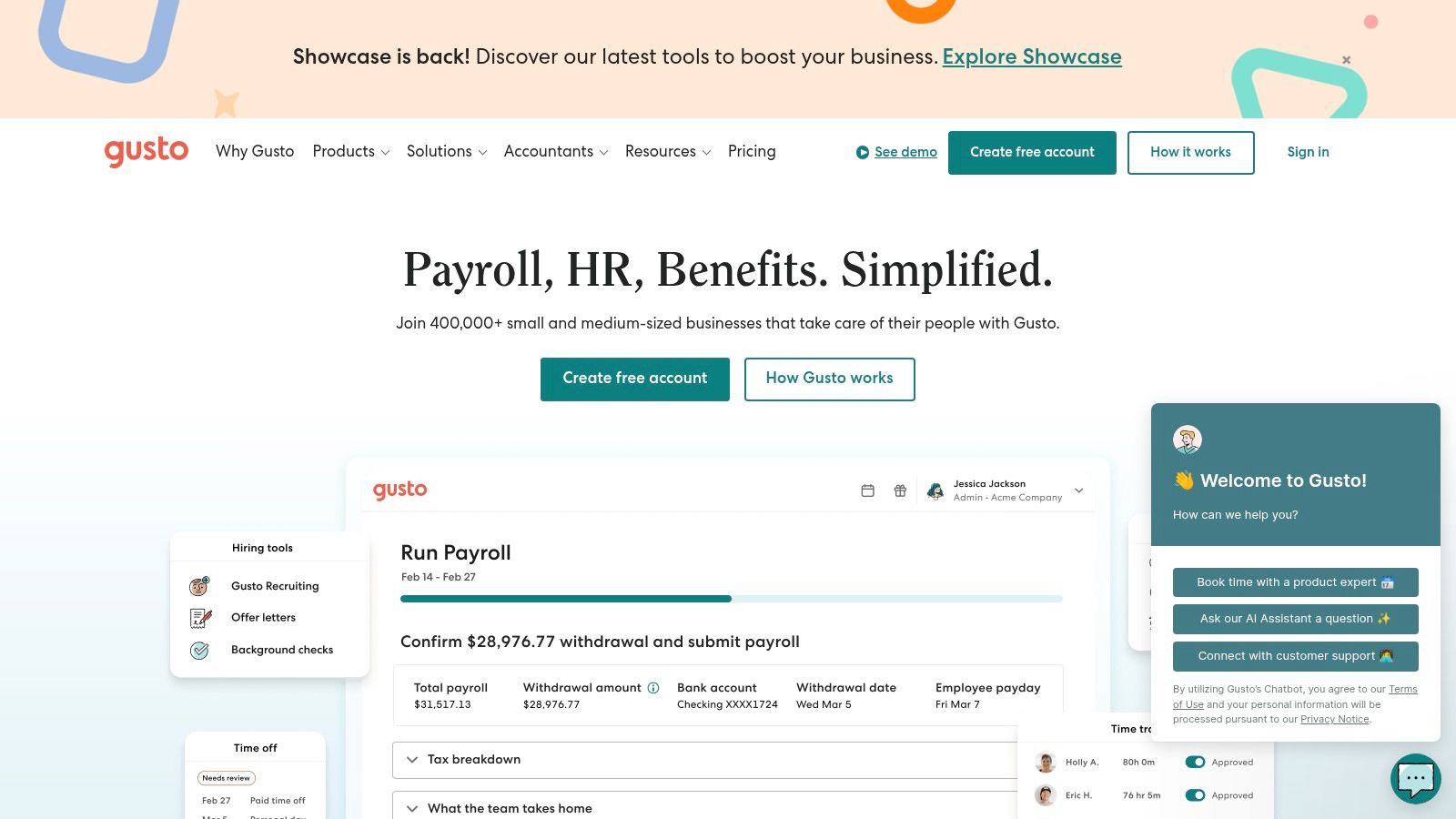
The platform truly shines in its user experience; the interface is clean, easy to navigate, and automates tax filings and compliance tasks that can be daunting for new employers. While it lacks some of the advanced performance management or analytics features of more specialized HRIS platforms, its core offering is robust, reliable, and perfectly tailored for the early stages of business growth. For startups prioritizing simplicity and compliance from day one, Gusto is a powerful and accessible choice.
Key Details & Features
- Best For: First-time founders and small startups that need a payroll-centric, all-in-one solution.
- Key Features: Full-service payroll, automated tax filings, benefits administration, employee onboarding, time tracking, and an optional global EOR service.
- Pricing: Starts at $40/month plus $6/per person for the Simple plan. Higher tiers add more advanced HR tools and support.
- Pros: Extremely user-friendly, excellent for payroll compliance, and transparent pricing at lower tiers.
- Cons: Can become costly as headcount scales, and more sophisticated HR analytics are reserved for the Premium plan.
3. Rippling
Rippling expands the definition of HR software by unifying HR, IT, and Finance into a single workforce platform. Its core strength lies in its deep, logic-based automation that triggers actions across the entire company. For example, onboarding a new hire can automatically provision their laptop, set up their SaaS accounts like Slack and Google Workspace, and enroll them in payroll and benefits, all from one place. This makes it one of the best HR software for startups that want to build a scalable, automated operational backbone from the very beginning.
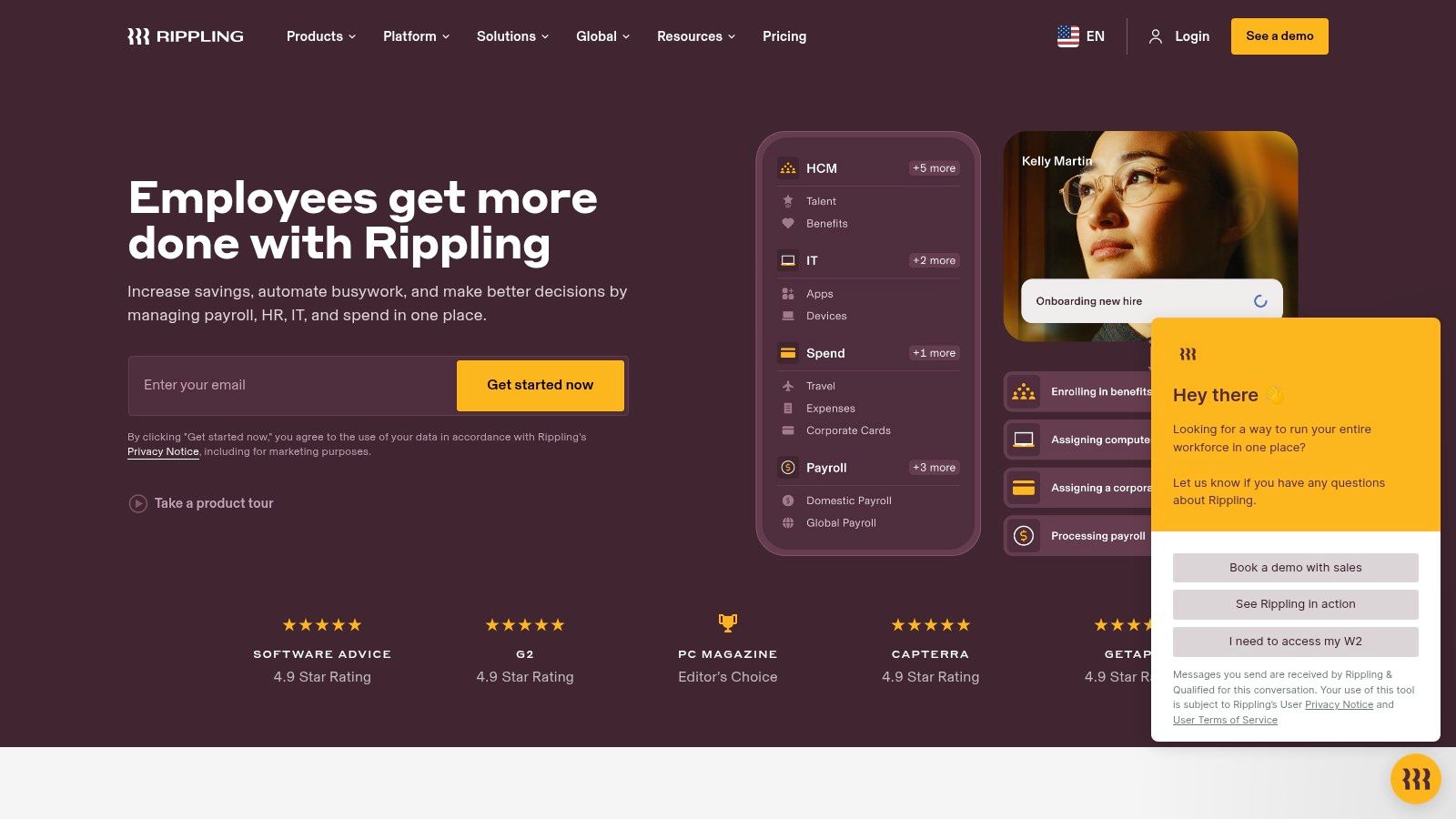
This "compound" system approach is what sets Rippling apart; it’s not just an HRIS, but an employee management engine that connects every system a worker touches. While its sheer breadth of features can feel overwhelming for a brand-new company needing only basic payroll, its modular design allows startups to add capabilities like global payroll, device management, or expense tracking as they grow. For tech-forward startups planning rapid scaling, Rippling offers an unparalleled level of integration and control.
Key Details & Features
- Best For: Fast-growing startups that need a unified platform to manage HR, IT, and Finance and want to automate administrative work.
- Key Features: Core HRIS with deep automation, US and global payroll, time and attendance, benefits administration, app/device management, expense cards, and over 600 integrations.
- Pricing: Custom quote required. Pricing is modular, starting with the core Rippling Unity platform, and then adding other products as needed.
- Pros: Unmatched automation across departments, scales from a small startup to a global enterprise, and its modular structure lets you pay for only what you need.
- Cons: Can be complex for very small teams just needing payroll, and the lack of transparent public pricing requires a sales call for a quote.
4. BambooHR
BambooHR establishes itself as a leading HR software for startups that have moved beyond basic payroll and are ready to build a people-focused culture. It excels as an HRIS (Human Resource Information System), acting as a central, organized database for all employee information. This platform is designed for growing companies that need to professionalize their HR processes, from seamless onboarding and time-off tracking to structured performance management, without overwhelming a small team.
The user experience is a significant differentiator; BambooHR is known for its clean, intuitive, and friendly interface that encourages adoption by employees and managers alike. It strikes a balance between comprehensive features and usability, making it a powerful tool for startups establishing their HR foundation. While core payroll is an add-on, its strength lies in creating a system of record that supports a positive employee lifecycle, making it an excellent choice for founders scaling their team and culture.
Key Details & Features
- Best For: Startups ready to invest in a dedicated HRIS to manage employee data and streamline core HR processes beyond payroll.
- Key Features: Core HR data and reporting, employee self-service, onboarding and offboarding, time-off tracking, performance management, and e-signatures.
- Pricing: Pricing is not public and requires a custom quote, but they offer flexible monthly billing without mandatory annual contracts.
- Pros: Exceptional user experience, strong focus on core HR and employee data, and scalable plans with volume discounts available. The implementation of digital transformation in HR is simplified with their platform.
- Cons: Payroll is a separate, optional add-on limited to the US, and some advanced features also come at an additional cost.
5. Deel
Deel has become the default HR software for startups built on a global or remote-first foundation. Its core strength lies in its powerful Employer of Record (EOR) service, which abstracts away the immense complexity of hiring, paying, and managing employees in over 150 countries. For founders looking to tap into a global talent pool without establishing local legal entities, Deel handles everything from compliant contracts to international payroll and benefits.

While its global capabilities are the main draw, Deel also offers robust US payroll and a free core HRIS (Deel HR) for smaller teams, making it a scalable solution. It centralizes contractor payments and full-time employee management into one unified dashboard. This makes it an indispensable tool for startups that plan to hire internationally from day one, providing a clear path to global expansion that traditional, US-centric HR platforms simply cannot match.
Key Details & Features
- Best For: Remote-first startups and companies planning to hire international employees or contractors.
- Key Features: Employer of Record (EOR) services in 150+ countries, global payroll, contractor management, visa support, and a core HRIS platform (Deel HR).
- Pricing: Contractors start at $49/month. EOR services start at $599/month per employee. Deel HR is free for organizations with up to 200 people.
- Pros: Simplifies complex international hiring and compliance, transparent pricing for EOR and contractor services, and offers a free, powerful HRIS tier.
- Cons: Can be more expensive than local-only solutions for US-based teams, and the total cost can increase as you add more of its modular services.
6. Justworks
Justworks operates as a Professional Employer Organization (PEO), which gives startups a unique advantage: access to enterprise-level benefits at small-business prices. This model allows early-stage companies to offer competitive health, dental, and vision insurance by grouping them with other small businesses, a major differentiator when attracting top talent. Beyond benefits, Justworks bundles payroll, compliance support, and on-demand HR consulting into a single, cohesive platform designed to offload administrative burdens from founders.

The platform is engineered for simplicity, managing complex tasks like payroll tax filing and W-2/1099 form distribution automatically. Its standout feature is the high-touch support, providing certified HR consultants to guide founders through tricky compliance and employee relations issues. While its PEO structure might be more than what a solo founder needs initially, it's an excellent choice for startups looking to scale quickly and provide premium benefits from the outset, positioning it as one of the best HR software for startups that prioritize employee perks and expert guidance.
Key Details & Features
- Best For: Startups wanting to offer premium benefits and outsource compliance and HR expertise.
- Key Features: Full-service payroll and tax filing, PEO-powered benefits administration, 24/7 customer support, HR consulting, and an available EOR service for global teams.
- Pricing: The Basic plan (payroll and benefits) starts at $59/month/employee. The Plus plan (adds compliance and HR tools) starts at $99/month/employee.
- Pros: Access to large-group benefits, strong compliance and HR support, and simple per-employee pricing for its core PEO services.
- Cons: The PEO model can be overkill if only payroll is needed, and some features like time tracking are add-ons.
7. RUN Powered by ADP
RUN Powered by ADP brings the power of a global HR leader to the small business landscape, making it a strong contender for the best HR software for startups that prioritize compliance from the outset. It’s a dedicated small-business platform that excels at core payroll and tax filing, especially for companies operating in multiple states or regulated industries where accuracy is non-negotiable. ADP's established brand and extensive partner network offer a sense of security and scalability that many newer platforms can't match.
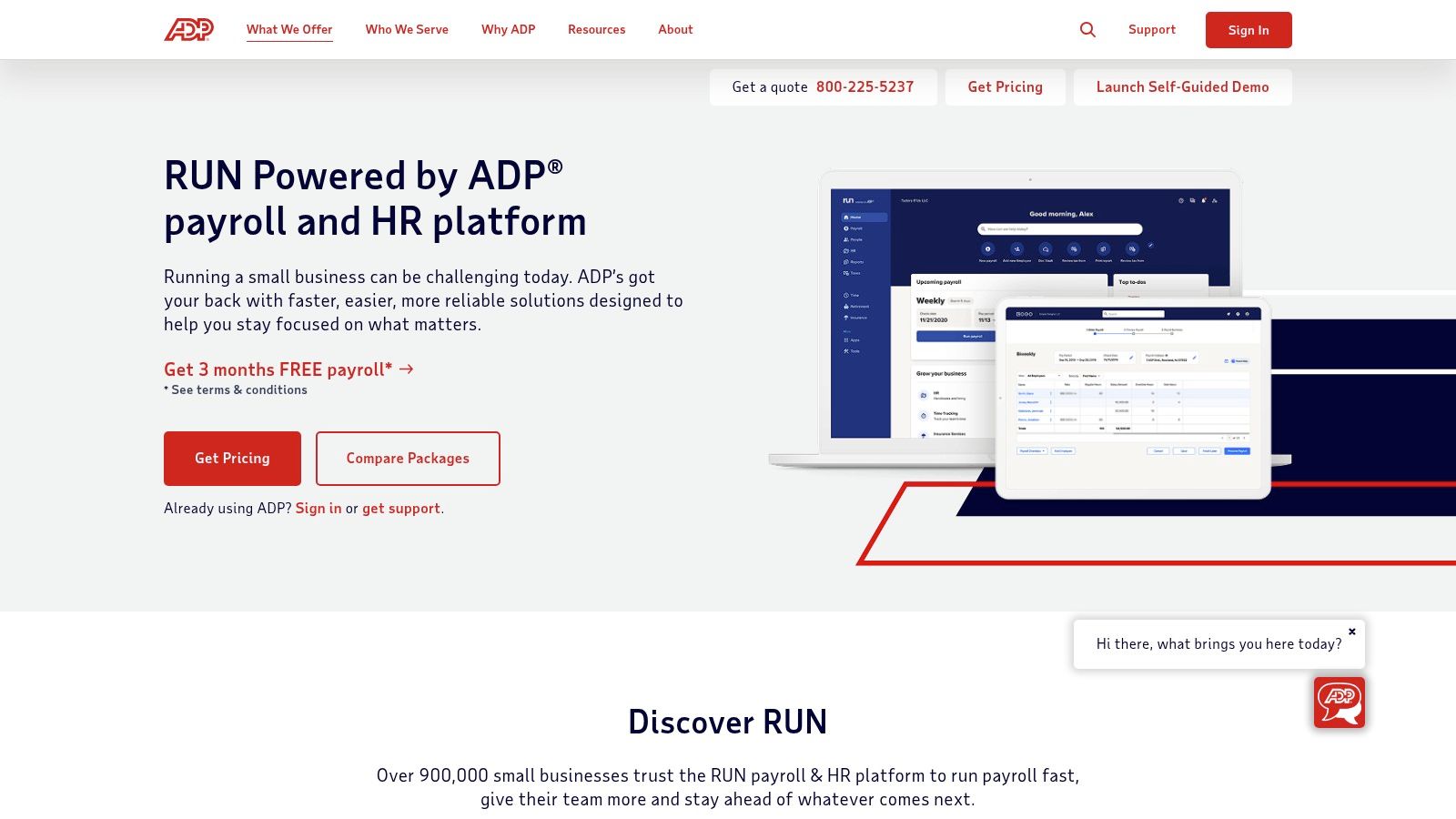
While the user interface might feel more traditional compared to nimbler competitors, its strength lies in its robust, compliance-focused backend. Startups can manage essential HR tasks like creating employee handbooks, setting up onboarding, and accessing compliance alerts. For businesses that foresee rapid expansion across state lines or value the backing of an industry giant for payroll and tax administration, RUN provides a solid, reliable foundation for HR operations.
Key Details & Features
- Best For: Startups in regulated industries or those planning multi-state operations who value compliance and brand stability.
- Key Features: Fast payroll and tax filing with multi-state support, basic HR tools including onboarding, handbook, and compliance alerts, benefits offerings via ADPIA, recruiting via partner integrations (ZipRecruiter, JazzHR, etc.).
- Pricing: Requires a custom quote based on company size and selected features; frequent introductory promotions are available.
- Pros: Highly recognized brand with an extensive partner ecosystem, good for regulated or multi-state payroll basics, and frequent introductory promotions for US SMBs.
- Cons: Pricing not fully transparent; requires a custom quote, and can feel heavier and more complex compared to newer SMB-focused tools.
8. Paychex Flex
Paychex Flex offers startups a reliable and scalable HR solution from a well-established name in payroll. Its strength lies in its modular design, allowing founders to start with a robust payroll and tax filing system and then add on more complex HR, time tracking, and benefits administration features as the company grows. This "pay-for-what-you-need" approach is practical for early-stage businesses managing tight budgets, providing a solid foundation without overwhelming them with unnecessary tools from day one.
While it may not have the modern, design-first interface of some newer competitors, Paychex Flex is a workhorse platform focused on compliance and functionality. Its extensive service catalog, from retirement services to job postings, makes it a contender for one of the best HR software for startups that anticipate rapid scaling and want a single vendor to handle their evolving needs. For a detailed look at how the platform works, you can explore how Flex Paychex simplifies payroll and HR for businesses of all sizes.
Key Details & Features
- Best For: Startups that want a trusted payroll provider with the option to scale into a full HR suite over time.
- Key Features: Online payroll and tax filing, employee onboarding and self-service, robust reporting, and optional add-ons for time tracking, performance management, and benefits.
- Pricing: Starts at $39/month plus $5/per employee for the Essentials plan. Custom pricing for higher tiers.
- Pros: Transparent entry-level pricing, 24/7 customer support, and a very broad catalog of add-on services.
- Cons: The user interface can feel dated compared to newer platforms, and many advanced HR features are locked behind higher tiers or sold separately.
Visit Paychex Flex
9. TriNet HR Platform
TriNet secures its spot as a strong contender for the best HR software for startups by offering a unique, scalable model that blends a modern HR platform with optional, hands-on advisory services. This hybrid approach is ideal for growing companies that need robust HR workflows like onboarding and document management but may also require expert guidance on complex HR issues without committing to a full Professional Employer Organization (PEO) model. The platform allows founders to start with core HR functions and add services as their needs evolve.
The core strength of TriNet's HR Platform lies in its flexibility. Startups can manage their HR essentials through a clean, centralized system and later opt into the "HR Plus" service to gain access to payroll processing and dedicated HR assistance. This adaptability makes it an excellent choice for businesses that anticipate future complexity but need a simple, affordable solution today. While its five-employee minimum may not suit the very earliest stage startups, its structure provides a clear growth path.
Key Details & Features
- Best For: Startups that need a foundational HRIS with the option to add expert HR advisory services as they scale.
- Key Features: Core HRIS (onboarding, PTO, document management), compliance assistance, optional full-service payroll, and add-on "HR Plus" advisory services for hands-on HR support.
- Pricing: The HR Platform starts at $8/per employee/month (billed annually) with a five-employee minimum. Payroll and HR Plus services are add-ons with separate pricing.
- Pros: Low entry price for the core platform, clear month-to-month and annual pricing tiers, and the unique ability to add advisory services when needed.
- Cons: A five-employee minimum billing is required, and benefits administration pricing is dependent on external broker arrangements, not bundled directly.
Visit TriNet HR Platform
10. HiBob
HiBob positions itself as the HR platform for modern, dynamic companies, making it one of the best HR software for startups that are scaling quickly and globally. It moves beyond standard HR administration to focus heavily on company culture and employee engagement. The platform, often just called "Bob," is designed to feel more like a social network than a traditional HRIS, with features like clubs, shout-outs, and surveys built directly into its core.
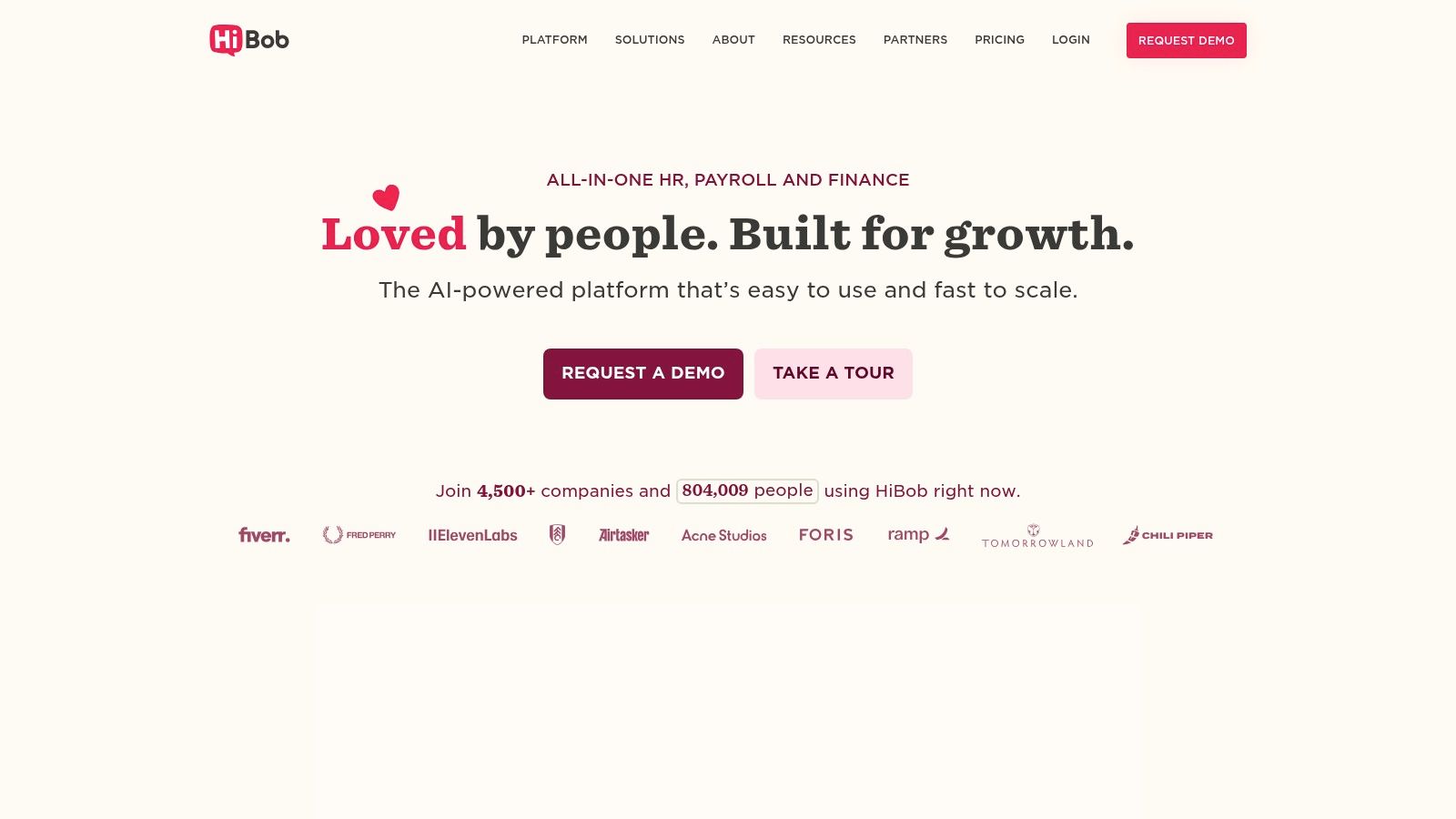
This culture-first approach makes it exceptional for hybrid and remote teams where maintaining connection is a major challenge. While it lacks its own native payroll system, HiBob integrates seamlessly with dozens of leading providers worldwide. Its strength lies in creating a central hub for employee experience, from performance management and compensation planning to fostering a vibrant, connected workforce, making it ideal for startups ready to invest in their people as a strategic asset.
Key Details & Features
- Best For: Fast-growing, global startups prioritizing employee engagement, culture, and a modern user experience.
- Key Features: Core HR with workflows and org charts, performance and compensation management, employee engagement tools (surveys, shout-outs), time and attendance, and extensive third-party integrations.
- Pricing: Custom pricing based on a quote; no public pricing is available. Typically aligns with mid-market solutions.
- Pros: Exceptional user interface and focus on culture tools, highly flexible and modular, and excellent for managing distributed teams.
- Cons: Pricing is not transparent and can be expensive for very early-stage startups, and implementation fees may apply.
11. Workable
Workable stands out in the crowded market of the best HR software for startups by focusing intensely on what early-stage companies need most: talent acquisition. It’s a recruiting-first platform, combining a powerful applicant tracking system (ATS) with essential HR functionalities. This approach allows startups to build a best-in-class hiring machine from day one, attracting and managing candidates effectively while covering basic HR needs like onboarding and time-off tracking. For founders prioritizing rapid growth through hiring, Workable is an ideal starting point.
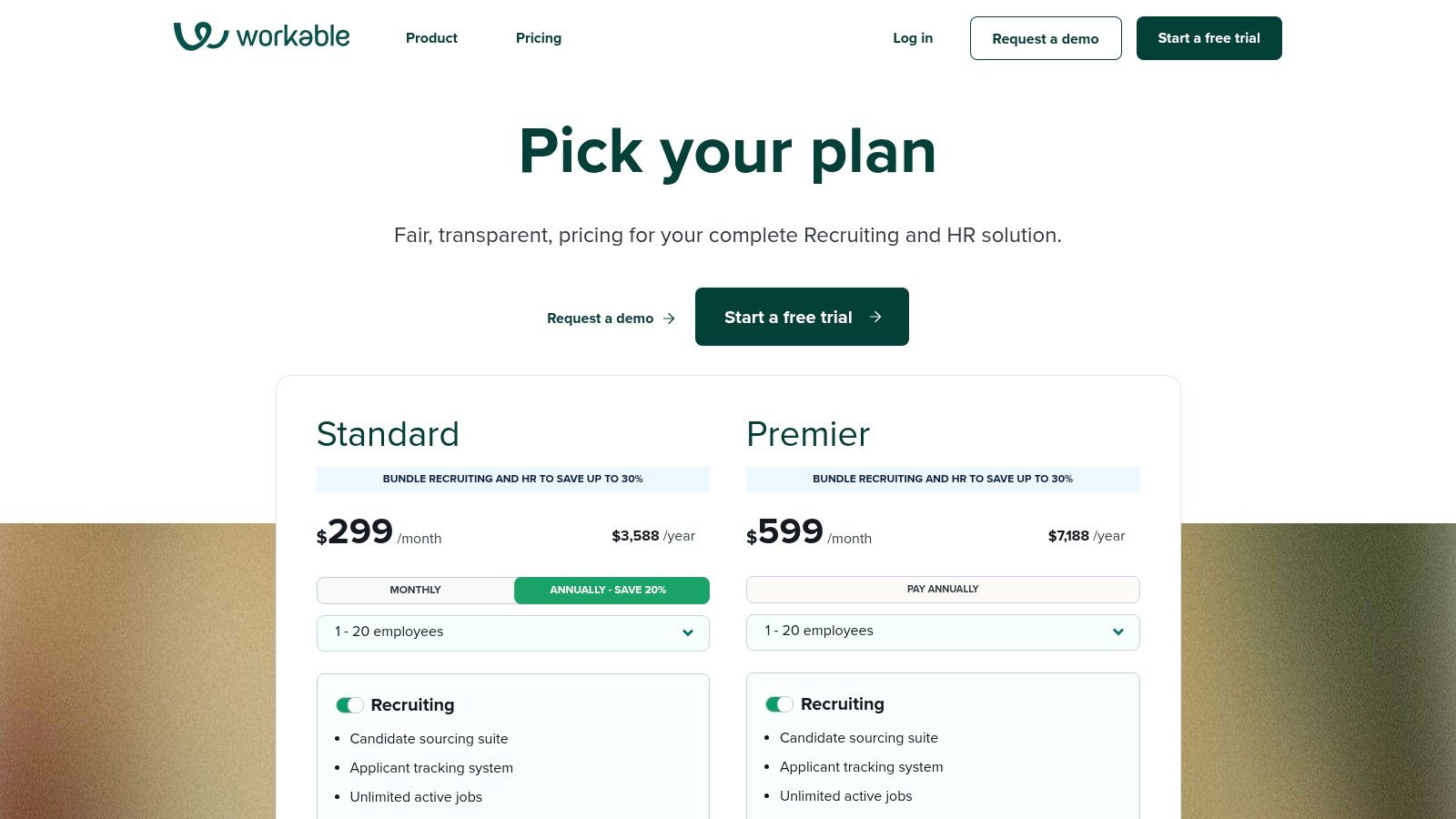
The platform’s strength lies in its comprehensive hiring tools, from one-click job board posting to over 200 boards, AI-powered candidate screening, and integrated interview scheduling. It is designed to be paired with a dedicated payroll provider, allowing it to focus on what it does best without becoming a bloated, overly complex system. For more information on how it stacks up against other tools, you can learn more about applicant tracking systems for small businesses.
Key Details & Features
- Best For: Growth-focused startups that need a top-tier recruiting tool with lightweight HRIS features.
- Key Features: Applicant Tracking System (ATS), one-click job board distribution, AI screening, interview scheduling, employee onboarding, PTO management, and robust payroll integrations.
- Pricing: The Starter plan begins at $149/month for up to 50 employees, with higher tiers available as the company scales. A 15-day free trial is available.
- Pros: Transparent, published pricing; unlimited active jobs in standard tiers; and a user-friendly interface that is easy to implement.
- Cons: Not a full human capital management (HCM) suite, requiring integration with a separate payroll solution, and some advanced features are locked behind higher-priced tiers.
12. G2
While not an HR platform itself, G2 is an indispensable resource for any startup navigating the crowded market of HR technology. It’s a massive software marketplace built on verified user reviews, providing unbiased, real-world insights into how different tools perform. Instead of relying on marketing copy, founders can use G2's powerful filtering and comparison grids to see how the best HR software for startups stacks up based on user satisfaction and market presence, often uncovering emerging solutions they might have otherwise missed.
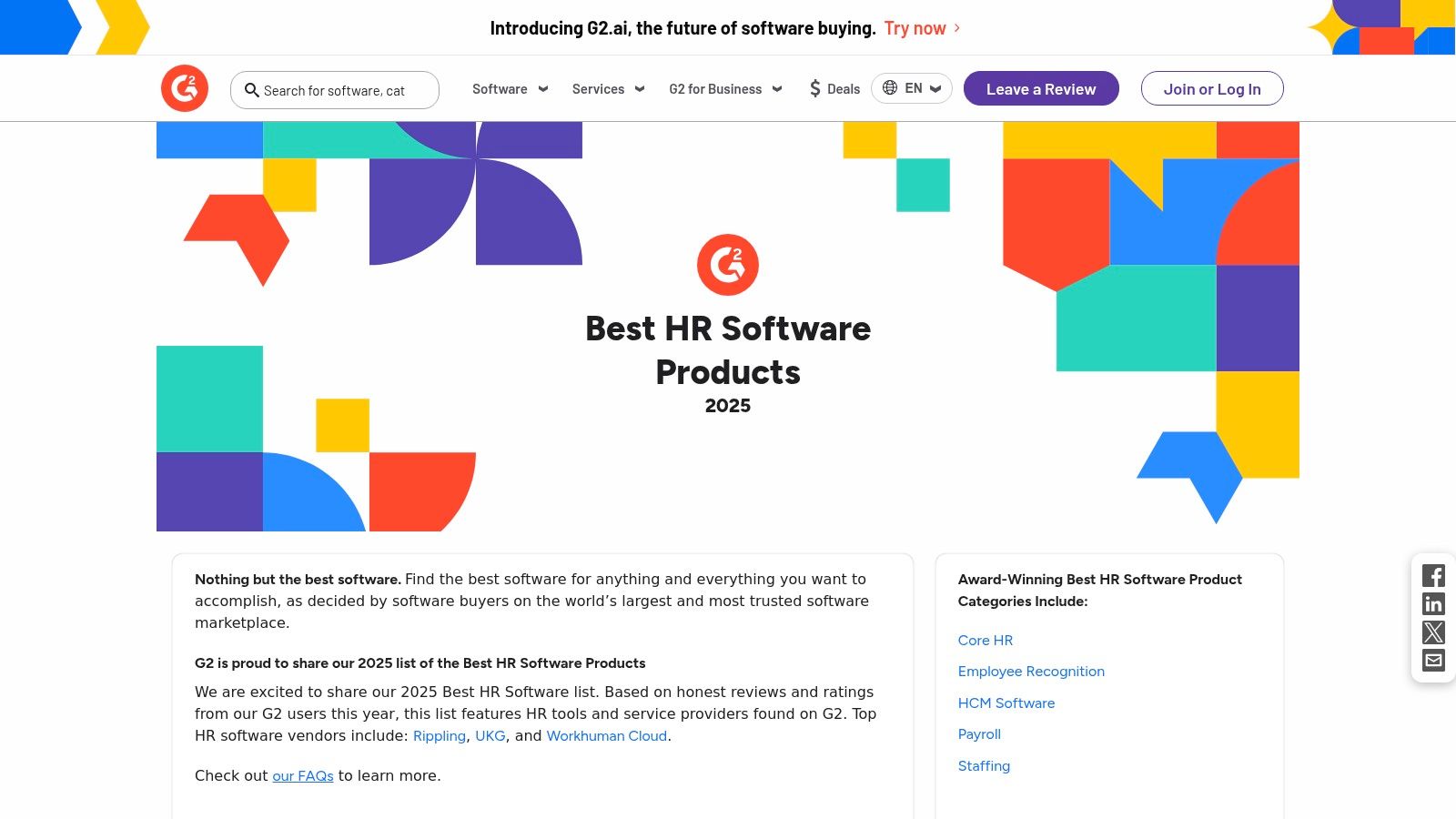
The platform’s strength lies in its crowdsourced data, allowing you to quickly shortlist vendors based on company size, specific feature needs, and user ratings for things like ease of use and quality of support. While established players with more reviews can dominate the leader grids, G2’s detailed review breakdowns offer an honest look at a tool’s limitations. It’s the perfect first stop to build a shortlist before you even start scheduling demos.
Key Details & Features
- Best For: Startups in the research phase looking to compare HR software options based on verified user reviews and data.
- Key Features: User reviews and ratings, detailed comparison grids across HR categories, filtering tools by company size and features, and direct links to vendor websites for demos.
- Pricing: Free to use for research and comparison.
- Pros: Crowdsourced reviews provide authentic insights, excellent for comparing usability and support, and helps identify both popular and niche HR tools.
- Cons: Listings can be influenced by vendors with larger review volumes, and pricing information is often estimated or incomplete, requiring direct vendor verification.
Top 12 HR Software Features & Pricing Comparison
Making the Final Decision: Which HR Software is Right for Your Startup?
Navigating the crowded market to find the best HR software for startups can feel overwhelming, but making an informed choice is a critical step in building a scalable, efficient, and people-first organization. As we've explored, the "best" platform is not a one-size-fits-all solution. Instead, it's the one that aligns perfectly with your startup's unique stage, priorities, and future ambitions.
Your final decision hinges on a clear understanding of your most pressing needs. A tool that excels for a 10-person, bootstrapped team will differ significantly from what a 100-person, venture-backed company requires.
Aligning Your Choice with Your Startup's Stage
To simplify the process, think about your primary challenge. Are you struggling with foundational tasks like payroll and benefits? A user-friendly, core HRIS like Gusto or BambooHR offers an excellent starting point, focusing on getting the essentials right without unnecessary complexity.
Is your main goal to unify disparate systems and manage employee data, devices, and apps from a single source of truth? An all-in-one "employee cloud" like Rippling is built for this modern, tech-centric approach. Conversely, if your startup operates globally from day one, a specialized EOR and global payroll platform like Deel is non-negotiable for maintaining compliance and a seamless international employee experience.
Key Factors for Your Final Evaluation
Before you commit, create a checklist based on these critical considerations:
- Scalability: Will this software grow with you from 20 to 200 employees? Look for tiered pricing and feature sets that support your projected headcount growth. Don't pay for enterprise features you won't use for years.
- Integration Ecosystem: Your HR software must work seamlessly with your existing tech stack (e.g., Slack, Google Workspace, your accounting software). Check for native integrations to avoid manual data entry and workflow headaches.
- Employee Experience: How intuitive is the platform for employees? A clunky, difficult-to-use system for requesting time off or accessing pay stubs creates friction and reflects poorly on your company culture. Prioritize a clean, modern user interface.
- Implementation and Support: What does the onboarding process look like? Does the provider offer dedicated support? For a small team without a dedicated IT department, a smooth implementation process is paramount.
The ultimate path forward involves hands-on evaluation. Use this guide to shortlist two or three platforms that resonate most with your needs. Schedule demos, ask targeted questions about your specific use cases, and request a trial period if possible. This upfront investment of time is one of the most strategic decisions you can make, creating an operational backbone that will support your team's success for years to come.
Ready to gain a competitive edge in hiring? The Klearskill AI-powered talent acquisition platform helps you identify and vet top candidates with unparalleled speed and accuracy, ensuring you build the A-team your startup deserves. Discover how you can make smarter, data-driven hiring decisions by visiting Klearskill today.
